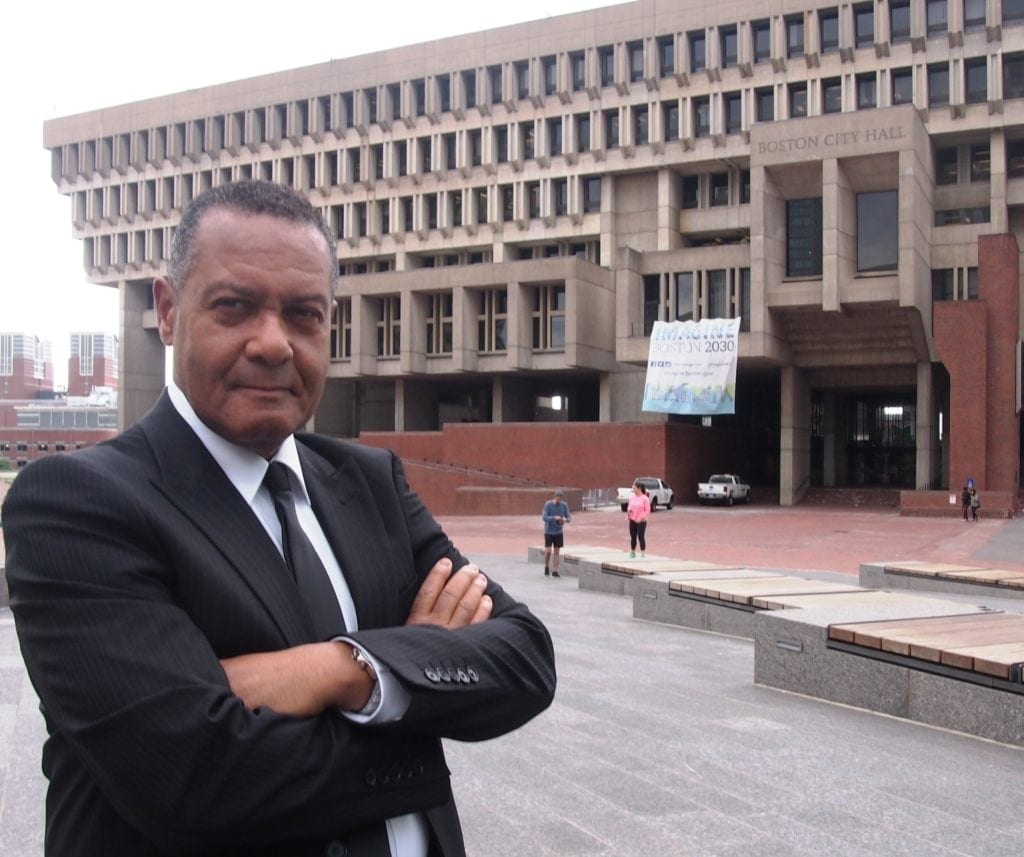
Of the seven people who pulled nomination papers to run for mayor in Boston, media attention has focused on two perceived front-runners: incumbent Mayor Martin Walsh and City Councilor Tito Jackson.
The nomination papers were due last Tuesday, and the field of seven was whittled down to three, the other four having failed to submit the required 3,000 valid signatures of registered Boston voters.
Though lacking in funds and name recognition, the self-described dark-horse candidate, Joseph A. Wiley of East Boston, may play an outsized role in the mayor’s race — not because of his ideas or political convictions, but by virtue of his very presence.
Who is he?
Wiley, who was born in Roxbury and graduated from Boston English High School in 1966, has kept a fairly low profile during his decades in Boston. He attended UMass Boston, then studied acting in San Francisco, where he lived for a year-and-a-half. He moved back to Boston during the 1970s, then lived in Manhattan from 1981 until 1994, working in real estate and customer service. Today, he lives in East Boston and works in customer service for a health insurance firm.
“I see public service as an extension of customer service,” he said. “Your job in public service is to help people.”
This is not the first time Wiley has considered a mayoral run. In 2009, he pulled nomination papers, hoping to run against then-incumbent Mayor Thomas Menino, but says he withdrew from the race without submitting the requisite 3,000 signatures.
This time around, Wiley put $13,000 of his own funds into a campaign account, he says, using savings and credit cards for $8,850 to pay professional petition gatherer Alexander Arsenault, 28, an Amherst native. Arsenault, who in 2014 told the Cape Cod Wave he typically charges between $2 and $3 per signature, catapulted Wiley from the ranks of the under-resourced campaigns that lack the volunteer base get on the ballot to the rarified world of certified mayoral candidates.
Perhaps it’s Wiley’s relatively low profile (try a Google search) that has some political observers wondering whether there’s an ulterior motive to his run.
“Someone told me ‘The rumor is, you’re a spoiler,’” he told the Banner. “’You’ve been put up to this by the Walsh people.’”
Wiley denies collusion with any other campaign.
“Nothing could be farther from the truth,” he said. “I don’t see how it makes sense. No matter what, the mayor will face an opponent.”
The numbers
Wiley’s candidacy forces a preliminary election to narrow the mayoral field to two candidates before the November 7 election. In Boston’s preliminary elections, blacks have tended to vote in lower numbers than whites. In the 2013 mayoral preliminary, for instance, when Marty Walsh and John Connolly emerged as finalists from a field of 12 candidates, the predominantly-black Dorchester-Mattapan Ward 14 saw turnout of 25.6 percent. In the predominantly-white West Roxbury Ward 20, turnout was 48.8 percent – nearly double.
If that pattern persists and the predominantly black wards and precincts that make up Jackson’s base turn out in low numbers in the Sept. 26 preliminary election, Jackson may appear weak, which could affect his ability to secure funding, endorsements and other support in the final six weeks of the race.
That scenario could play out well for the Walsh campaign. On the other hand, Jackson’s campaign could boost turnout in communities of color, as could those of the 12 candidates so far certified to run for the Roxbury-based District 7 council seat and those of other candidates of color in the city, including District 1 candidate Lydia Edwards.
Issues and money
Regardless of which candidate benefits from his run, Wiley says he plans to use his mayoral campaign to advocate for more affordable housing, better schools and better public safety. He does not yet have a campaign manager, nor has he raised money or put together a team. He says he’s currently working on a website. As for the specifics of his platform, he says that can be ironed out once he’s in office.
“Do I have all the answers?” he said. “No, I don’t. But somebody once said a leader recognizes what he or she doesn’t know and seeks out someone who does. A leader doesn’t go into office with all the answers.”
As for the asymmetrical nature of the race – Wiley had $4,600 in his account as of May 15; Jackson, $96,538 and Walsh, $4,380,868.72 – Wiley says money won’t necessarily win the race.
“This race won’t be won by who has the largest bank account,” he said. “It should be run on ideas and the direction people want to take this city in the next ten years.”







